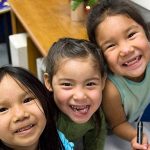Ontario curriculum changes developed in response to Truth and Reconciliation Commission Calls to Action will be implemented in September 2018.
Dianne Roach, education manager for Garden River First Nation, said her community is pleased their “true history will finally be taught to all students” as a result of the curriculum changes.
“Both the Algoma District School Board and the Huron Superior Catholic District School Board have been working with our community as well as the other First Nation communities to ensure that our voices are heard and will assist in supporting Indigenous perspectives within the curriculum,” Roach told Sault This Week.
Heather Irwin, a spokesperson for the Ministry of Education, said drafts of the curriculum revisions will be released in the coming months, to have the final version ready for the start of the next school year.
“In response to the Truth and Reconciliation Commission’s calls to action, Ontario is working with First Nations, Metis and Inuit partners to co-develop revisions to the Ontario curriculum to enhance mandatory learning on the history of residential schools, the legacy of colonialism and the importance of treaties,” Irwin said.
The changes, into which the Ontario government is making a three-year annual investment of $5 million, have been developed with the help of a Truth and Reconciliation Curriculum Steering Committee.
The committee “is composed of residential schools survivors, Metis Nations of Ontario, Tungasuvvingat Inuit, Indigenous Trustees’ Councils, Ontario Federation of Indigenous Friendship Centres, Ontario Native Women’s Association, Ministers’ Student Advisory Council and Ministry of Education representatives,” said Irwin.
The first phase of revisions “will focus on strengthening the learning connected to Indigenous perspectives, cultures, histories and ways of knowing, such as the residential school system, treaties and the Indian Act,” she said.
They will be implemented in the Social Studies curriculum for grades 4 to 6, and history for grades 7, 8, and 10.
Roach said a two-day session is being held on the proposed curriculum revisions in Sudbury on Jan. 11 and 12 “where all the indigenous partners will have an opportunity to ensure our perspectives are included in the revisions.”
A press release issued by the ministry on Nov. 8 about the changes explained, “The revised curriculum includes grade-appropriate learning opportunities about residential schools, treaties and Indigenous people’s historical and contemporary contributions to Canada.
The most recent curriculum revisions support mandatory learning on the impact of colonialism and the rights and responsibilities we have to understand our shared history and to build our collective future in the spirit of reconciliation.”
Irwin said the ministry is also working “with education partners to enhance educator capacity to deliver the revised curriculum.”
Phase 2 of the new curriculum will see broader changes, said Irwin.
“The Ministry of Education has committed to revise Social Studies, grades 1 to 3; Geography Grade 9; Civics and Citizenship, Grade 10; and select senior courses from Canadian and World Studies, grades 11 and 12, and Social Sciences and Humanities, grades 11 and 12,” said Irwin.
This second round of changes will begin in winter of 2018.
While the Truth and Reconciliation Commission curriculum changes will make province-wide changes affecting all students, ADSB and HSCDSB students will be exposed to more localized information as well.
“The North Shore Tribal Council has contracted Dr. Pamela Toulouse who has created local history curriculum for students from Kindergarten to Grade 3,” said Roach.
Toulouse is associate professor in the School of Education at Laurentian University in Sudbury. She has expertise in Indigenous matters and is, herself, a member of Sagamok First Nation.
“This curriculum speaks to the Anishinabek and the relationship we have with Mother Earth, the gifts of the land and the Robinson-Huron Treaty of 1850 which is the treaty signed within this geographical area,” Roach said.
Both school boards have also agreed to utilize a curriculum developed by the Assembly of First Nations, titled “We Are All Treaty People,” she said.
ADSB and HSCDSB plan to go beyond the curriculum to promote reconciliation, Roach said.
“Both boards have hired Indigenous Team Leads that are responsible for engaging local Indigenous Partners including Batchewana, Garden River First Nation, Thessalon First Nation, Mississauga First Nation, Serpent River First Nation, Chapleau Cree, Michipicoten, Brunswick House, Sault College, Algoma University, as well as the Metis Nation of Ontario and the Indian Friendship Center,” said Roach.
“As well, [the team leads] are responsible for researching resources to support our Ojibway Native Language Teachers and supporting Professional development for schools across the Algoma District.
Algoma District School Board has just hired an Indigenous student Re-Engagement Lead and School Support Teacher who works with our students and families by ensuring our students receive cultural, social, academic and aspirational supports along with supporting the delivery and integration of culturally responsible pedagogy.”
“It is timely that the provincial curriculum is actually being revised to include the recommendations from the Truth and Reconciliation Report including the dark history of Residential Schools and an opportunity to clarify the true spirit and intent of our Treaties,” said Roach.
“We strongly believe that teaching our true history will inspire our children and youth to reach for a higher education.”








